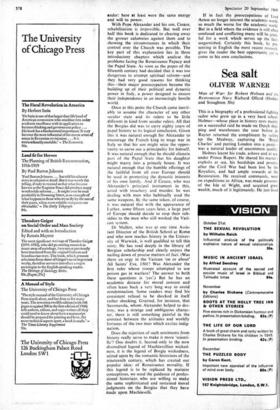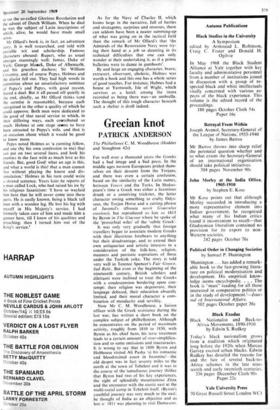Sea salt
OLIVER WARNER
Man of War: Sir Robert Holmes and the Restoration Navy Richard 011ard (Hodder and Stoughton 50s) This is a biography of a professional fighting sailor who grew up in a very hard school. Holmes—whose place in history rests mainly on a successful raid he made on Dutch ship- ping and warehouses the year before de Ruyter returned the compliment by sailing up the Medway, capturing the 'Royal Charles' and putting London into a panic— was a natural leader of uncommon quality.
Holmes learnt his trade, ashore and at sea, under Prince Rupert. He shared his master's exploits at sea, his hardships and poverty after the Civil War had been lost by the Royalists, and had ample rewards at the Restoration. He received commands, went on expeditions to Africa, was made governor of the Isle of Wight, and acquired great wealth, much of it legitimately. He just lived to see the so-called Glorious Revolution and the advent of Dutch William. When he died he was the subject of Latin inscriptions of which, alive, he would have made small sense.
Mr 011ard's book is, in fact, an adventure story. It is well researched, and told with enviable wit and scholarship. Famous characters abound: Rupert, who as usual emerges stunningly well; James, Duke of York; George Maack, Duke of Albemarle, and his graceless duchess; Sir William Coventry, and of course Pepys. Holmes and the diarist fell out. They had high words in committee about an unsatisfactory nominee of Pepys's and Pepys, with good reason, feared a duel. But it all passed off quietly in the end, chiefly, so Mr 011ard thinks (and the surmise is reasonable), because each recognised in the other a quality of which he could approve. Both men were dedicated to the good of that naval service to which, in their differing ways, each contributed so much. Holmes at one stage semis to have been attracted to Pepys's wife, and that is an occasion about which it would be good to know more.
Pepys noted Holmes as 'a cunning fellow, and one (by his own confession to me) that can put on two several faces, and look his enemies in the face with as much love as his friends. But, good God! what an age is this, and what a world is this! that a man cannot live without playing the knave and dis- simulation.' Holmes in his turn could write a shrewd sentence. Years later he reports of a man called Lock, who had raised his ire by his religious fanaticism: 'I have so waylaid him here that he will never come into these parts. He is easily known, being a black tall man with a wooden leg. He lost his leg with myself in His Majesty's service. I had formerly taken care of him and made him a gunner here, till I knew of his qualities and preaching; then I turned him out of the King's service.' As for the Navy of Charles II, which looms large in the narrative, full of battles and stratagems, surprises and reverses, there can seldom have been a neater summing-up of what was going on in the tactical field than the remark of Mr 011ard's that 'the Admirals of the Restoration Navy were try- ing their hand at a job so daunting in its technical difficulties that one can only wonder at their undertaking it, as if a prima ballerina were to dance in gumboots'.
By and large an engaging character, brave, extravert, observant, choleric, Holmes was worth a book and this one has a whole series of good touches. For instance, Holmes had a house at Yarmouth, Isle of Wight, which survives as a hotel: among the items recorded as being there was—an umbrella. The thought of this tough character beneath such a shelter is droll indeed.









































 Previous page
Previous page